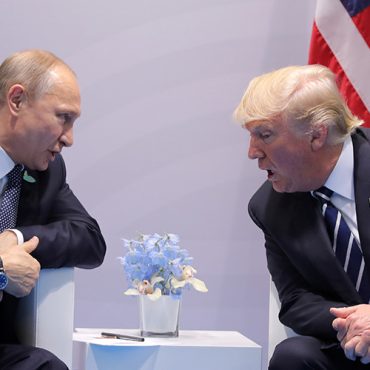This is a rush transcript. Copy may not be in its final form.
AMY GOODMAN: This is Democracy Now! I’m Amy Goodman, with Nermeen Shaikh.
NERMEEN SHAIKH: Israeli forces have killed at least 11 people, including five children, in strikes on the southern city of Rafah. Israel has repeatedly attacked the city ahead of an expected ground invasion. There are new reports the Biden administration has approved Israel’s plan to attack Rafah in exchange for Israel not launching counterstrikes on Iran.
The latest article by our next guest is headlined “Why Israel-Iran War Is a Lifeline for Netanyahu.” In it, she writes, quote, “Just days ago, much of the world’s attention was on the impending famine in Gaza, and on Israel’s failure to achieve its war objectives of toppling Hamas and returning hostages more than six months into the war. Israeli Prime Minister Benjamin Netanyahu was under pressure from U.S. President Joe Biden to allow in sufficient humanitarian aid and reach a cease-fire, as well as appeals from Israeli protesters to seal a hostage deal and hold new elections.
“But at night on Saturday, April 13, all that faded instantly as Iran launched hundreds of drones and missiles at Israel in much-anticipated retaliation for an Israeli strike that killed senior Iranian military [officers] in Damascus, Syria, on April 1.”
AMY GOODMAN: That article is by Mairav Zonszein, a senior Israel analyst for the International Crisis Group. She’s joining us now from Tel Aviv.
Mairav, thanks so much for being with us. Can you start off by just continuing your argument? Lay out what you think has happened in the last few days.
MAIRAV ZONSZEIN: Thanks for having me.
Well, essentially, we have an ongoing war, for months and months, that Netanyahu has orchestrated in a way that, clearly, he’s talking about a total victory, that most Israelis now understand he’s not able to achieve. He has lost a lot of legitimacy both at home and abroad. At the same time, many Israelis have supported the war effort. They’re in trauma. And so you have this chaotic situation.
And just days ago, we started to see what looked like, at least rhetorically, cracks in what has been U.S. support for Israel’s war effort in Gaza. And just as things started to seem to change a little bit, primarily as a result of an absolute humanitarian disaster, man-made, in Gaza, all of a sudden attention has gone elsewhere, to another very worrying development with Israel and Iran.
Now, I can’t speak to Netanyahu’s intent on the decision to strike the Damascus consular facility on April 1st, but what I can say is that when you’ve lost legitimacy, and when former security officials and even some current ones are telling everyone that Netanyahu is not fit to lead and is not fit to be providing any kind of safety and security for Israelis, and then he takes the decision to strike a consulate, then that’s clearly something that he took into account. In other words, it could have either led to nothing, or it could have led to what we saw, and in which case he’s now basically, you know, benefiting from the fact that all the world now has to kind of cooperate with him. The Western capitals, surely, some Arab countries, as well, have no choice but to kind of band together against this Iranian threat.
NERMEEN SHAIKH: And, Mairav, could you explain? Your article before this one, earlier this month, is titled “The Problem Isn’t Just Netanyahu, It’s Israeli Society.” Explain what you mean by that, and what you think the problem is with people focusing only on his being the head of Israel, Netanyahu, and taking all the decisions.
MAIRAV ZONSZEIN: Right. Well, I mean, it’s important to understand some of the nuances. I mean, basically, Israeli society is largely a right-wing society. It is a society that has not spoken about or thought about Palestinians or the occupation except when it’s forced to. And it is a society that has gotten used to acting with impunity.
After the Hamas October 7th attack, which was truly unprecedented for Israelis, there was huge consensus for the war, and there’s been almost, you know, complete apathy to what’s happening in Gaza. Israelis are not really interested or emotionally capable of handling that. And there’s been a dehumanization of Palestinians for a very long time. So you have this kind of consensus and just support for Israel’s war effort.
At the same time, you have a leader, specifically Netanyahu, but also the far-right government in general, that many liberal secular Israelis don’t support. And so you have a situation in which the Western capitals in the world, that have pretty much unconditionally supported Israel, have found a way to try and kind of split between, you know, criticism of Netanyahu but supporting Israeli society at large. Now, I understand why they’re doing that, but it’s just important to understand that even if you took Netanyahu out of the equation and you put somebody else, some of his political rivals, in the leadership positions, their approach to the Palestinian issue is almost identical. There’s really no difference there. So, the Israelis that are protesting Netanyahu now are not protesting him about his policies on Palestinians. They’re protesting him about his attacks on their own freedoms and the fact that kind of the same rights violations that Israel has been doing for years are now starting to seep into their own world.
AMY GOODMAN: Can you talk, Mairav, about this possible trade-off that’s being reported, U.S. wanting Israel not to attack Iran again, but they can invade Rafah?
MAIRAV ZONSZEIN: I think all of this is largely theater and largely performative. I mean, basically, Israel has been dangling the threat of an invasion in Rafah for months now. It doesn’t mean that I don’t think it’s something that it plans to do. But the U.S. pushback on it, while firm rhetorically, hasn’t really been convincing. You know, I’m not convinced that the U.S. is actually about to withhold aid or that the U.S. or Biden were actually going to stop Israel from invading Rafah, because they largely support the war effort.
And Israel is almost surely going to respond to the Iranian strike in some way. And it’s understandable, you know, if we understand the ways Israel works, that it would do so. I think it’s also understandable that Israel, you know, would now — since it hasn’t already responded, it’s now going to consider its options in how it can do that and how it can leverage that situation. So, now, in effect, it has the benefit of being able to kind of dangle both threats — we’re both going to attack Iran, and we’re going to attack Rafah. And so, ultimately, those things are still the case. You know, so I —
AMY GOODMAN: We have to leave it there, Mairav Zonszein, senior Israel analyst for the International Crisis Group. We’ll link to your piece in Foreign Policy. I’m Amy Goodman, with Nermeen Shaikh, for another edition of Democracy Now!











Post comments (0)